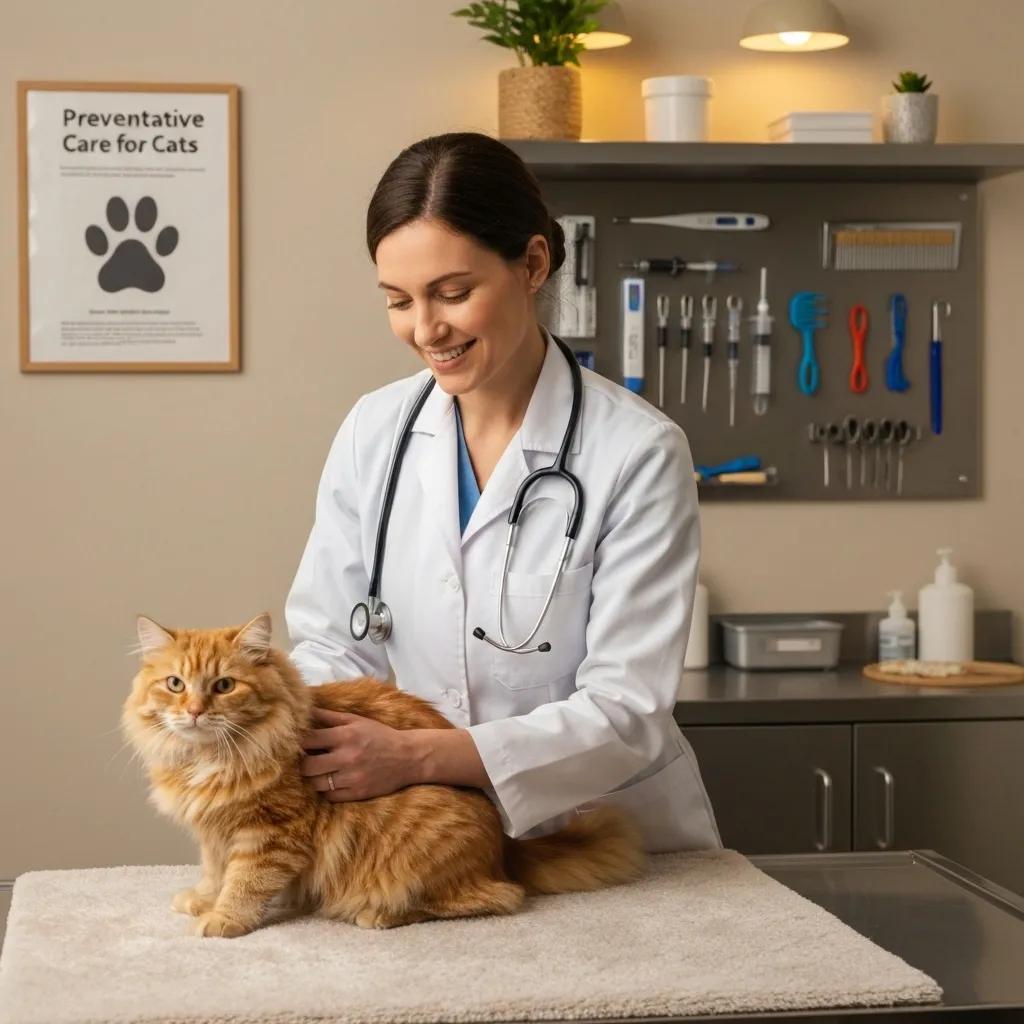Recognizing Cat Allergy Symptoms: A Guide to Early Detection

Catching Illness Early in Cats: Your Guide to Top-Notch Preventative Care in Long Beach
Spotting health issues in your cat early can turn a slowly developing problem into something manageable, helping your furry friend live a longer, happier life. In this guide, we’ll explore why noticing those subtle signs is so important, look at common indicators of allergies and skin irritation, compare key diagnostic tests, and show how preventative care at Pine Animal Hospital leads to earlier diagnoses. We’ll also cover how you can help manage feline allergies at home, explain why Pine Animal Hospital is the go-to place in Long Beach, and address your questions about how often screenings are needed and what diagnostic options are available.
Why Early Disease Detection is a Game-Changer for Cats
Catching illnesses early means keeping a close eye on your cat’s health and getting prompt diagnostic checks to find problems before they become serious. This approach makes treatment simpler and significantly boosts your cat’s quality of life. By screening proactively, we can intercept issues with organs, the immune system, or skin right at the start, leading to less invasive treatments and quicker recoveries.
What Are the Big Wins of Early Detection for Your Cat’s Health?
- Keeping organs working well with timely intervention
- Saving money by avoiding complicated treatments
- Minimizing pain and distress that comes with advanced illness
- Extending their life by consistently monitoring their wellness
These benefits highlight why regular check-ups are the cornerstone of great preventative care for cats and pave the way for much better treatment results.
How Does Catching Illness Early Improve Treatment Success?
When we detect sickness early, we can stop it from getting worse by addressing infections, inflammation, or metabolic imbalances before they cause lasting harm. Quick identification allows for treatments tailored specifically to the problem—like special diets for allergies or support for kidney issues—leading to better outcomes and fewer side effects.
Why Do Cats Tend to Hide When They’re Not Feeling Well?
Cats have a natural instinct to hide pain or weakness, a survival trait from their days as both hunters and hunted. Subtle changes in their behavior—like grooming less, losing a little weight, or scratching more often—can be the first clues. This is why regular veterinary check-ups are so vital for uncovering hidden health concerns.
What Are the Usual Early Signs of Allergies and Skin Irritation in Cats?

Allergies and skin irritation in cats often stem from an overactive immune response to fleas, food ingredients, or environmental triggers. This can lead to itching and inflammation, affecting their coat and overall comfort. Recognizing these signs early can prevent long-term issues and secondary infections.
How Can You Spot Flea Allergy Dermatitis in Your Cat?
Flea allergy dermatitis happens when even a single flea bite causes intense itching, hair loss, and scabs, usually around the base of the tail. You might notice:
- Bald spots and redness on their hindquarters
- Excessive licking focused on their lower back
- Dry, flaky skin or crusts from constant scratching
Getting flea control in place quickly can break this cycle and bring relief.
What Are the Signs of Food and Environmental Allergies in Cats?
Symptoms of food allergies can include recurring ear infections, digestive upset, and itchy skin on the face, paws, or belly. Environmental allergies, or atopy, often show up as seasonal itching, sometimes with sneezing or watery eyes. Noticing these patterns helps us guide you toward special diets or ways to reduce exposure to triggers.
Which Symptoms Point to Skin Irritation in Cats That Isn’t Allergies?
Skin problems not caused by allergies—like bacterial or fungal infections, reactions to something they touched, or parasites—can cause:
- Small bumps or pus-filled spots on the skin
- Patches of hair loss with red, irritated skin
- An unpleasant odor from bacterial overgrowth
Figuring out the exact cause early on ensures the right treatment plan is put in place.
What Diagnostic Tests Help Detect Illness Early in Cats?
At Pine Animal Hospital, our diagnostic services use a range of lab tests and imaging to find signs of disease before your cat shows obvious symptoms. This helps us create the best treatment plans and predict outcomes.
Before we dive into each test, this table gives you a quick overview of key diagnostics, what they’re for, and how they help with early detection:
| Diagnostic Test | Primary Purpose | Benefit for Early Detection |
|---|---|---|
| Complete Blood Count | Checks red blood cells, white blood cells, and platelets | Identifies anemia, infection, and inflammation |
| Urinalysis | Analyzes urine’s chemical makeup, cells, and sediment | Reveals kidney problems and urinary tract issues |
| X-ray Imaging | Provides images of bones, chest, and abdomen | Detects tumors, fractures, and enlarged organs |
| Ultrasound | Uses sound waves to view internal organs | Finds fluid buildup and abnormalities in organs |
| Fecal Examination | Tests for internal parasites and their eggs | Diagnoses parasitic infections early |
| Skin Scraping | Collects skin samples to look for mites | Pinpoints parasitic skin conditions and ringworm |
How Do Routine Blood Tests Aid in Early Disease Detection in Cats?
Regular blood tests measure cell counts and enzymes that indicate organ function. They can reveal early signs of anemia, infection, liver strain, and kidney issues. Small changes in these results often appear before your cat shows any symptoms, allowing our veterinary team to suggest dietary changes or supportive care before significant damage occurs.
The Importance of Diagnostics in Keeping Your Cat Healthy
Catching health problems early in cats, like kidney disease and diabetes, through regular blood and urine tests can greatly improve their chances of recovery and their overall quality of life. This proactive approach allows for effective management with medication or diet adjustments before outward signs even appear.
This information directly supports our focus on how crucial early disease detection and routine diagnostic screenings are for maintaining your cat’s health and improving treatment results.
What Role Does Urinalysis Play in Spotting Kidney and Urinary Problems?
Urinalysis checks how concentrated the urine is, its acidity, and if it contains protein, sugar, or crystals. Detecting early signs like protein in the urine or urine that’s too diluted can help us take steps to slow down kidney decline and prevent urinary blockages, which is key to your cat’s long-term health.
Detecting Feline Chronic Kidney Disease Early Using Biomarkers and AI
A study found that standard diagnostic methods often miss early signs of feline chronic kidney disease (CKD). However, by using a specific marker in the blood and urine and applying machine learning, researchers were able to accurately diagnose CKD up to six months earlier than traditional tests.
This study provides scientific evidence for why early detection of kidney disease is so important and highlights the role of advanced diagnostic tools in feline care.
How Are X-rays and Ultrasounds Used for Diagnostic Imaging in Cats?
X-rays help us see the skeletal system, find foreign objects, and check for gas patterns in the body. Ultrasound gives us real-time views of the heart, liver, kidneys, and bladder. Together, these imaging tools can reveal tumors, enlarged organs, or fluid buildup before they affect your cat’s behavior or appetite.
When Should Fecal Exams Be Done to Check for Parasites?
We recommend routine fecal exams every six months to check for common internal parasites like roundworms, hookworms, and coccidia, which can affect nutrient absorption and the immune system. Getting rid of parasites early improves gut health and prevents anemia, especially in young kittens and older cats.
What Specialized Tests Help Diagnose Skin Conditions in Cats?
For more complex skin issues, we offer allergy testing, fungal cultures, and cytology. Skin biopsies and intradermal tests can pinpoint specific allergens or confirm autoimmune conditions, allowing us to create precise treatment plans to restore your cat’s skin health and comfort.
Current Approaches and Challenges in Diagnosing Cat Allergies
This review discusses the difficulties and progress in diagnosing allergies in cats. It emphasizes the importance of accurately identifying which cats are affected and notes that using a high-quality source of a specific allergen protein has led to advancements in clinical diagnosis and care for feline allergies.
This source is relevant to our discussion on understanding and diagnosing feline allergies and skin issues, particularly concerning the diagnostic methods available.
How Does Preventative Veterinary Care Help with Early Disease Detection?

Preventative veterinary care involves regular wellness check-ups, vaccinations, and educating owners. This helps us establish your cat’s normal health markers and track any changes over time, so we can address potential health issues early on.
What’s Included in an Annual Cat Wellness Exam?
An annual wellness exam for your cat includes a thorough physical check-up, a look at their teeth and gums, and routine blood and urine tests. By establishing a baseline of their health, we can monitor for changes and recommend any necessary adjustments to their diet or lifestyle.
How Often Should Older Cats in Long Beach Get Health Screenings?
Cats over seven years old are considered seniors and benefit greatly from health screenings every six months. These semiannual check-ups, including blood tests and urinalysis, help us catch conditions like an overactive thyroid, kidney problems, or arthritis early. This proactive approach allows us to create personalized management plans to keep them mobile and their organs functioning well.
Why Are Vaccinations and Parasite Prevention So Important for Cats?
Vaccinations prepare your cat’s immune system to fight off common viruses and bacteria, while parasite prevention protects them from fleas, ticks, and intestinal worms. Combining these preventive measures reduces the risk of illness and skin irritation, contributing to their overall health.
How Does Dental Health Affect Early Detection of Oral Disease?
Dental exams can reveal plaque buildup, gum inflammation, and tooth decay before they cause pain that might change your cat’s eating habits. Healthy teeth and gums support a strong immune system, and catching dental disease early can prevent inflammation that might affect the heart and kidneys.
How Can Pet Owners Help Manage and Prevent Feline Allergies and Skin Irritations?
Managing your cat’s health at home complements the care they receive from us by reducing exposure to allergens and supporting healthy skin, which helps lessen the frequency and severity of flare-ups.
What Are Effective Ways to Control Fleas and Manage Allergies?
Use year-round flea prevention, whether topical or oral, and treat your home environment regularly. Washing bedding, vacuuming carpets, and using gentle, hypoallergenic shampoos can help break the flea life cycle and reduce allergen exposure.
How Can Diet Help Manage Food Allergies in Cats?
Switching to a limited-ingredient or hydrolyzed protein diet can help identify and eliminate common food allergens. We monitor your cat’s response over about eight weeks. Carefully reintroducing foods can help pinpoint specific triggers, allowing for a long-term, balanced diet without unnecessary ingredients.
What Environmental Changes Can Reduce Allergy Symptoms in Cats?
Using air purifiers, controlling indoor humidity, and avoiding cleaning products with strong scents can help reduce airborne allergens. Regularly changing bedding and using allergen-proof covers can also minimize exposure to pollen and dust.
When Should You See a Veterinarian About Your Cat’s Skin Issues?
If your cat is scratching excessively for more than seven days, has patches of hair loss, open sores, or signs of a secondary skin infection, it’s time to seek professional help. Early veterinary care can prevent chronic skin problems and restore your cat’s comfort.
What Makes Pine Animal Hospital the Top Choice for Early Detection in Long Beach?
At Pine Animal Hospital, we combine our passion for feline care with advanced diagnostic tools to provide personalized treatment that focuses on prevention, early detection, and supportive care.
What Advanced Diagnostic Services Does Pine Animal Hospital Provide?
Our in-house lab offers quick results for blood work and urinalysis. Our digital X-ray and ultrasound equipment provide detailed images, and we also perform on-site skin scrapings and fecal exams, giving us a comprehensive diagnostic picture for timely treatment decisions.
How Does Pine Animal Hospital Support the Health of Senior Cats?
Our senior cat wellness packages include screenings twice a year, nutritional advice, and assessments for joint health. We create tailored care plans to address age-related issues like arthritis, kidney changes, and dental disease, helping your older feline friend stay vibrant.
What Do Pet Owners in Long Beach Say About Our Early Detection Care?
Our clients frequently share how we’ve detected hidden conditions like kidney disease, allergies, and dental problems before they became severe, leading to easier treatments and happier pets. Their feedback reflects our dedication to proactive and compassionate veterinary medicine.
Frequently Asked Questions About Early Disease Detection in Cats
Many owners want to understand more about when to screen, what tests are involved, and the benefits of early detection for their cats, so they can make informed decisions and avoid emergency visits.
Why Is It So Important to Detect Cat Allergies Early?
Catching allergies early allows us to start targeted treatments, like specific immunotherapy or dietary changes. This prevents long-term skin damage, secondary infections, and discomfort that can significantly impact your cat’s quality of life.
What Diagnostic Tests Are Recommended for Feline Skin Irritation?
Skin scrapings, fungal cultures, and allergy tests help us pinpoint the cause of itching. Blood work and urinalysis can rule out underlying systemic issues. Combining these diagnostics allows us to choose the most effective treatment and provide faster relief.
How Often Should My Senior Cat Be Screened in Long Beach?
Senior cats should have health screenings every six months. These check-ups include comprehensive blood panels and urinalysis to help us identify conditions like hyperthyroidism or early kidney decline before symptoms become noticeable.
Taking a proactive approach to your cat’s health ensures that subtle changes are never missed. This empowers you and our veterinary team to protect your cat’s well-being and maximize the many years of loving companionship you share.
